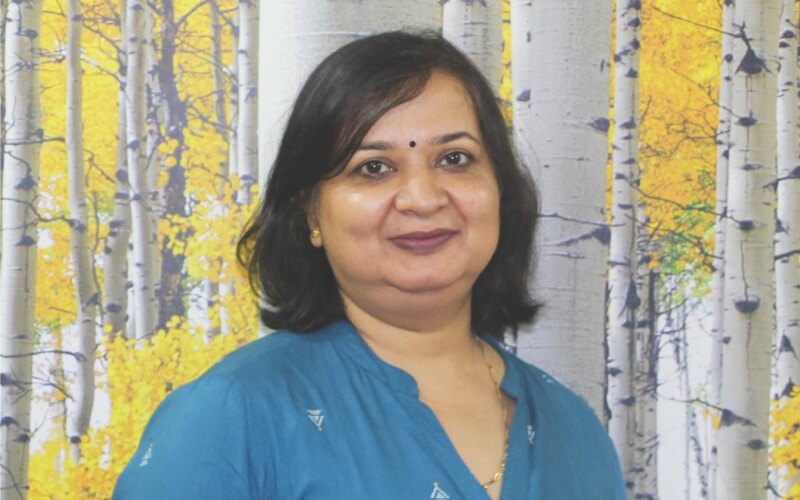In an exclusive tête-à-tête with Paper Mart magazine, Ms. Mala Mohini, COO, EnviroWay Bio-Science Pvt. Ltd., sheds light upon the specialisations of the company, the obstacles in relation to patriarchy, the future potential for pulp & paper industry, and message to young women who wish to enter the paper industry.
I would say that anybody can achieve anything they wish to – nothing is impossible!… If the focus, belief and emotions are properly channelized, one would be able to work in a positive manner and can achieve anything in life.
Paper Mart: Could you present a brief overview of EnviroWay Bio-Science Pvt. Ltd. and its product portfolio for the pulp & paper sector along with your day-to-day life in the organisation?

Mala Mohini: EnviroWay Bioscience Pvt. Ltd. is one of the premier companies in India in wastewater treatment and reuse, with a strong industrial presence. From inlet (untreated wastewater) to outlet (treated wastewater), we provide a complete portfolio of advanced environmental solutions – products, services and technology. We, at EnviroWay Bio-Science, have provided economical solutions to several clients in the pulp and paper industry, such as Bilt, Kuantum Papers, Orient, Sangal, Star Paper Mill, and Emami Pulp & Paper, among others.
Water, as the major raw material of the pulp and paper industry, is used extensively during production. We’ve been providing the paper companies with the solutions to treat wastewater for almost ten years now. Based out of Gurugram, we are technically supported by EnviroWay, Canada. Most of the paper mill owners know our organisation, and they personally know me as well. I am, at present, managing the entire India operation. I’m the single woman here, and around 250 men, of different expertise, are working with me. Treating wastewater is not an easy task as it requires a lot of expertise – the knowledge of biology, chemistry, mechanical, electrical, civil instrumentation, and automation. Hence, you require a diverse team. I get calls from paper companies when they have the challenges in their treatment plant. I provide them with the solutions on phone, messages, or through technical visits.
PM: Both the paper industry and the water treatment industry are predominantly male-centric. What are the challenges you strive to overcome every day?
MM: In most of the seminars, conferences, and workshops, I happen to be the only woman sitting. People normally get surprised to see me lead it because they all know it is a fieldwork. Women are sensitive, loyal, dedicated to their pursuits, and have the grip and study a lot; however, they have been reluctant to join the paper and water treatment industries because it entails fieldwork. Also, the industry has been reluctant to bring more women at the factory level since safety is a concern. Managing the workforce was initially a challenge for me as I lacked confidence. However, with the experience I have gained over the years, I have acquired the necessary skills. Now, if they approach me with their water and wastewater problems, I have answers to their queries. With time, I have earned the respect and confidence.
Watch: IVAX Paper Chemicals Interview
PM: What are your views on the Indian paper industry in terms of challenges and opportunities?
MM: The plastic is now banned and the government will be stricter related to the environment. With that, there lies a huge opportunity for the paper and the textile sector. The challenge is that the paper has to be more advanced to hold the liquid product. None of the products come without packaging. And even in that packaging, one needs to give the manual which is again in the paper form.
While COVID brought education to digital forms, the education system in India cannot be completely online. It brings health issues to kids in the long term, and as a parent, I would never want that for the children. Education, in the offline mode, needs books. Hence, there are huge opportunities in the paper industry. Even as we go to a restaurant or travel in a train, we want to have food in disposable plates that could be thrown. However, we should look forward for more recycled raw materials in the production and reduce the use of wood or trees in the production process.
Regarding the challenges, the competition is tough in the paper industry. Initially, it was easier to understand the dynamics and grow in the paper industry. Hence, a lot of people ventured into the industry. In 2012-13, the rules were more lenient. However, presently, the government has come up with stringent rules in the direction of their responsibilities towards the environment, and society. This has significantly brought down the profit margin of paper mills. Additionally, after the COVID-19- pandemic, the market has also given them other set of challenges. The positive part is the opening of the global markets. While China has been dominant in the market, the Indian paper industry can also grow significantly if the Indian government provides support and increases the opportunities of paper and paper product exports to different countries. This can enable the paper industry to have better profitability. Further, the employment opportunities in the industry would also grow.
PM: Paper mills are generally located in remote areas and considered less lucrative than other sectors. What are your thoughts?
MM: Since the paper industry is water intensive; it needs a bigger land – i.e., extra space for putting up the treatment plant. This is why the mill owners look forward to cheaper lands, which are available in the remote areas. As paper mills work 24×7, the women are reluctant to join and even I have been reluctant to hire them as women safety still remains a huge concern. However, that is not the case for every paper mill. As paper units are old, they’re mostly located in the Ganga and river basin states. While initially these were remote, the cities have emerged and the population around the paper plants have grown by 60 to 70 percent. Recently, the government has come up with a lot of plans regarding land allocation, infrastructure, transportation, electricity, digitalisation, GST, MSME, start up funds, environmental and safety norms for the industrial units to create an environment for ease of doing responsible business. This will encourage more women to join at factory level for work.
PM: Could you shed some light on the future potential for the pulp & paper industry along with the key trends that are catalysing the growth of the market?
MM: Initially after independence, we have multiplied in all directions; however, it was not a well-planned, focused, and balanced development. The current government is focussing on making businesses across various industries into more focused, productive, and responsible by channelizing in every direction. Since I am in the water industry, I have experience of working in association with several industries such as sugar, textile, dairy, paper, and so on. In my opinion, the paper industry, at present, is a highly advanced industry. The paper industry professionals are technically more educated, qualified, and positively co-relate with each other to make the industry units technically and technologically advanced.
The government should initiate planning for making the industry well-organised for a better future. The paper industry should come under a specific ministry. With a planned approach, I foresee a humongous opportunity in the Indian paper industry. We are more advanced than many other countries and have ample resources. Being highly water intensive, the paper mills cannot be set up in a region or a country that doesn’t have significant water sources. If the government makes a plan to export the paper products in such countries, the companies in India would have huge opportunities. I hope that magazines like Paper Mart can bridge the gap between the government and the paper industry.
PM: In brief, tell us about your journey that led you to this industry along with your experience at EnviroWay Bio-Science.
MM: I had a difficult journey. The owner of the company, EnviroWay Bio-Science, Mr. Bob Behari stays in Canada and it was difficult to manage his business in India from there. He had seen issues like water logging and other problems in India and wanted to do his bit for his motherland, which is why he came up with a natural biotechnology product. In the early 2000s, the industry, as well as the government, was in a transition phase. I took up control here in 2012. The industries were all located in remote areas and I had to travel for meetings. Moreover, nobody was interested in treating the water because they didn’t feel that it was needed. Thanks to the government that came in 2014! The first thing they did was work for the rivers. During 2013-2014, CPCB implemented a ‘Charter for Water Recycling and Pollution Prevention in Pulp & Paper Industries in Ganga River Basin’ in five identified clusters located in Uttarakhand and Uttar Pradesh. The mills adopted a positive approach and made huge investments to support the entire charter. A lot of efforts had to be made in spreading awareness regarding the chemicals and online monitoring systems.
I appreciate that the paper mill owners are very positive and high-spirited. Since I have been closely working with them for a while, I have seen the financial challenges they underwent. While the government came up with tight rules, they did not come up with pertinent solutions. The charter was new and the people were confused. They knew about their paper product but were unaware of the pollution it creates and the preventive measures required. This is where we came into the picture!
Also Read: Pioneering Women in the Paper Industry
PM: What would be your message to young women, who would want to follow similar footsteps?
MM: I would say that anybody can achieve anything they wish to – nothing is impossible! The only difference between a man and a woman is that a woman is more likely to be on the softer side, her physical safety becomes the concerns for herself and the employers. If the focus, belief and emotions are properly channelized, anyone can enhance their knowledge, expertise and experience in the professional world in a positive manner for future professional growth and security.
When I started my journey, I was stressed that I was responsible not only for me but for over 100 other workers too. However, the more I learned, the more powerful I became. In today’s world, it’s not the weapon, which makes you powerful, it’s the knowledge! India has a good education system and the knowledge can be gained by anyone, irrespective of their gender. I understand safety is a concern for women where the government can help to facilitate women workforce. If that is addressed, more women would be coming out in the field to work. We can certainly do wonders!
We all have studied the Tortoise and a Rabbit story in the childhood. The moral of the story was that we all can win the race by consistently working hard in the focused direction as the Tortoise did.



